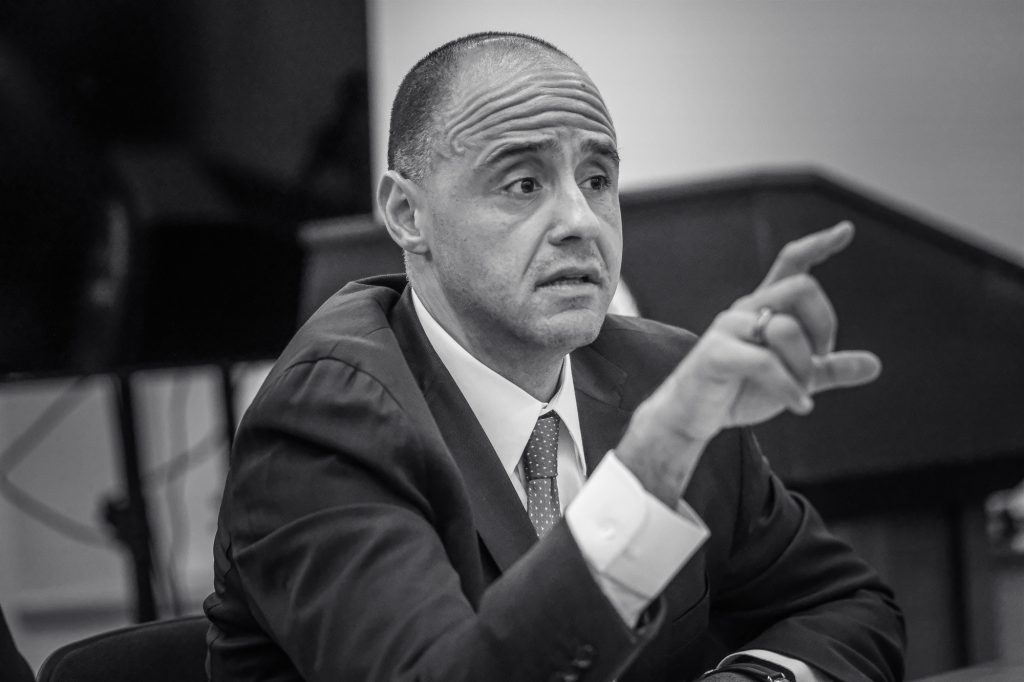Any die-hard sports fan knows this simple truth: When a call goes in your team’s favor, the refs are wise and impartial. When one goes against it, the refs are incompetent and biased. Why think too hard about what really happened when you can just blame the people calling balls and strikes?
Prosecutors and police in D.C. have adopted similar logic when it comes to rulings from the District’s Court of Appeals. Over and over again, appeals judges have reversed convictions secured by prosecutors that relied on guns seized by Metropolitan Police Department officers. United States Attorney for D.C. Matthew Graves has repeatedly blasted these rulings as out of step with legal standards for police searches around the rest of the country, but the court hasn’t budged. D.C. appeals judges delivered two more opinions outlining constitutional violations in MPD search tactics in the past month alone. Both of the arrests involved the department’s controversial Gun Recovery Unit, which has spurred lawsuits and calls for its dissolution going back years.
There’s a bit of a lag between the arrests and when the appeals court scrutinizes officers’ search tactics; the arrests involved in these recent cases happened all the way back in 2018. But attorneys and criminal justice advocates tell Loose Lips that little has changed with MPD’s approach, even though officers’ tactics keep getting thrown out of court. The biggest difference now is that prosecutors have sought to blame these rulings as they’ve faced tough questions about their persistently low charging rates in an increasingly violent city.
“There’s something really wrong with the D.C. police department, and they’re not going to change,” says Lynne Bernabei, an attorney representing an MPD sergeant who claims she was retaliated against after blowing the whistle on improper search tactics. “They do not want to change. That’s very clear.”

MPD spokesperson Tom Lynch writes in a statement to LL that the department “is aware of the ruling and will continue to work with our partners at the United States Attorney’s Office to ensure that our members are trained appropriately to ensure compliance with recent rulings.” But Graves has noted in the past that it’s difficult to manage this training when judges present a moving target of what is and is not acceptable. A spokesperson for the USAO did not respond to LL’s requests for comment on these rulings as of press time.
Still, several observers monitoring MPD’s practices say they haven’t seen much change on the ground. Police officials have often said that sudden “jump out” searches, a controversial practice that is at the heart of one of the recent court rulings, are no longer part of MPD’s playbook. Yet former MPD Chief Robert Contee admitted in a deposition with Bernabei that he had no idea whether they were still occurring, despite the department’s prohibition of them.
And Bernabei points to two different rulings in federal court cases alleging civil rights abuses by MPD where judges found that jump outs are still occurring. One involves an arrest that happened as recently as April 2022.
“The fact that the U.S. Attorney’s Office is defending this, and saying they should be allowed to act in this way, is a real indicator that they probably are,” says Christy Lopez, a professor at Georgetown Law and former co-chair of the D.C. Police Reform Commission who spent years studying police abuses with the Justice Department. “Because that means they’re not getting any disincentives from the U.S. Attorney’s Office, they’re being told that’s how they should be policing. … It’s just a good reminder that sometimes police and prosecutors can be more concerned about letting police do what they want, rather than ensuring police do what works.”
Lopez calls the recent appeals court rulings “really sensible.” In a perfect world, at least, she feels the decisions could actually “help policing be more effective.”
Lopez says research suggests that simply rounding up young Black men in so-called “high-crime areas” is not only constitutionally suspect, but not a particularly good way of finding people committing acts of violence in these communities. The two appeals court rulings outline how MPD too often casts a wide net to arrest people rather than focusing its resources.
In one case, officers drove up and jumped out of their cars to search a group of men in an alley in Kenilworth. Landon Mayo fled, officers gave chase, and then found an illegal gun and drugs along his “flight path,” the ruling says. In the other case, the cops stopped a car due to its “extremely dark” tinted windows and demanded that a passenger, Travanion Ward-Minor, get out of the vehicle. When he expressed hesitance and admitted he had some cannabis in his possession, the officers cuffed and searched him, and found a gun shortly after. In both cases, the court found officers did not have sufficient reasons to search Mayo or Ward-Minor.
“A lot of people in these neighborhoods have guns for their own protection, but that is not the same thing as pinpointing people who are in danger of becoming shooters or being shot,” says Patrice Sulton, executive director of the DC Justice Lab. “I feel like police officers are just being misled into believing that they’re doing something effective when they’re not. I don’t think they’re just out here wanting to play John McClane and bust heads. I think they actually do think it’s helping, and it’s doing nothing on gun violence at all.”
Lopez also observes that, in the Mayo ruling, six of the seven judges reviewing the case wrote that “some individuals in highly policed communities might fear overaggressive police conduct and may flee as a result even if they are innocent of any wrongdoing,” indicating that these sorts of jump-out tactics are counterproductive. (This was, in fact, the second time the appeals court took up Mayo’s case with even more justices finding in his favor this time around.) Essentially, she believes MPD has been so aggressive that their “reputation” and resulting “alienation” in these communities may have “fueled the court’s decisions.”
“The police department should recognize that they’ve hoisted themselves on their own petard, that the court is deciding that there’s no real culpability associated with running because of how the Gun Recovery Unit has treated people,” Lopez says. “If they’re going to have more confidence from the courts, as well as the public, they have to stop these tactics and these decisions are just a reflection of that.”
The Gun Recovery Unit has indeed faced scrutiny for years, largely due to these sorts of searches that courts are now rejecting. The Police Reform Commission recommended disbanding the unit entirely, as did a former member of MPD’s own command staff, after a series of lawsuits described unconstitutional and, at times, “unjustified sexually invasive” searches by GRU officers. A report commissioned by the D.C. Council found that the overwhelming majority of stops and arrests by the GRU involved Black people. And some GRU members were investigated after being photographed in 2016 with a flag emblazoned with violent images and the phrase “Vest Up One in the Chamber.”

Contee and his deputies said several times over his brief tenure as chief that they were rethinking the unit and its approach to seizing as many guns as possible, consequences be damned. But the unit was active as recently as 2022, according to the lawsuits Bernabei referenced, and the ACLU’s D.C. chapter was still calling for its abolition in 2023. LL has not found any evidence of Pamela Smith addressing the GRU or its practices publicly since she won confirmation as MPD’s new chief last fall.
Lynch, the MPD spokesperson, says the unit has been “reorganized” and many of its responsibilities distributed to Violent Crime Suppression Division, which manages the “crime suppression teams” that work in each police district. Court documents suggest that those units use similar tactics as the GRU. One CST operating in Southeast is at the heart of an ongoing criminal investigation of 19 officers; and CST Officer Terence Sutton was convicted of murder in 2022 following a fatal vehicle chase.
“This happens with law enforcement agencies all over the country, as these sorts of units routinely develop bad reputations, develop scandals, cost cities a lot of money,” Lopez says. “And unfortunately, the response is generally to rebrand them, rename them without changing the underlying strategy and tactics that resulted in those problems. And I haven’t seen much in D.C. that indicates that, whatever they’re calling them now, that they’re fundamentally changing this approach.”
Ultimately, Lopez says she is still “hopeful” that change is possible in departments like MPD. She just doesn’t have much confidence that police will do so absent pressure from either politicians or prosecutors. Lawmakers have, by and large, given up on their efforts to reform MPD as the furor over George Floyd’s killing in Minnesota has faded in the rearview and crime has risen. The USAO, however, exists a bit removed from such political pressure due to its federal status and could therefore demand a different approach from MPD. Prosecutors certainly have plenty of incentive to do so, considering they have taken some heat for their recent drop in the number of cases they pursue, which is often tied directly to the quality (and constitutionality) of arrests made by MPD.
But they’ve shown little interest in doing so, choosing instead to complain about the court’s rulings. Graves has publicly derided the decisions as outliers nationally, but Sulton says judges in many other states have issued similar rulings. She says the D.C. courts have actually allowed some police search practices that are barred elsewhere, such as letting police search multiple people found at an address where one person is under investigation.
Sulton finds it particularly concerning that the USAO appealed the court’s initial ruling in the Mayo case from January 2022, when a panel of judges first rejected MPD’s tactics and tossed out the evidence that led to his conviction. (One judge dissented from the initial ruling, a fact Graves has trumpeted.) But the full court ruled overwhelmingly, 6-1, two years later that the search was unconstitutional.
“For them to take all this up on appeal tells you that they think they’re allowed to do this,” Sulton says. “They’re willing to keep pressing it until the courts tell them no, or even after the courts tell them no. And people should be really concerned about that.”




